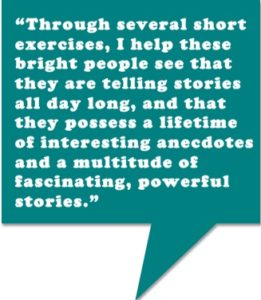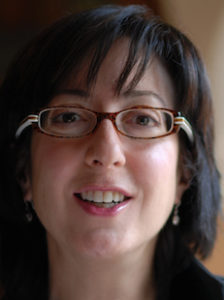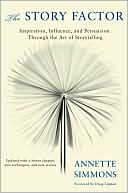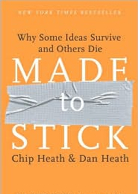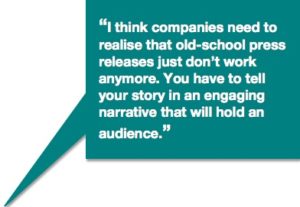Not long ago, Tim Enereta in his blog Breaking the Eggs, listed storytellers to follow on Twitter. Although some of them represented realms beyond traditional oral storytelling (“old school,” as Tim calls this tradition), most were performance storytellers. He explained that he was not including organizational-storytelling types, noting that he would leave it to someone in that group to develop an appropriate Twitter Follow list for the organizational folks.
I am accepting Tim’s challenge, although I am embracing a broader group than those specifically identified with organizational storytelling. I prefer the broader term “applied storytelling,” and my list of folks (and entities) to follow also includes some performance storytellers. These are the storytellers that seem to travel in circles beyond performance and with whom I often seem to rub virtual elbows.
Some of these folks are worth following because they are very active on Twitter and provide value with their tweets. Others are less active but are worth following in the hope they might follow you — because they are important figures in storytelling who might like to know what you’re up to. Interesting trends: An awful lot of Californians, New Yorkers, and Austalians among these folks. (I also theorize that storytelling folks tend to be right-brained and prefer Macs to PCs, but that’s another post.)
I’d like this to be an organic, dynamic list that will continue to grow, so I welcome suggestions of folks to add.
These are in no particular order, and descriptions are taken directly (sometimes with minimal editing) from each person’s Twitter profile. Finally, I had hoped to to have these ready for Follow Friday, but I’ve been frantically getting ready to travel cross-country in an RV and am now in that RV with limited Internet access.
mnjorgensen/Martin Jorgensen • Melbourne, Australia • Bio: Fascinated with digital narratives, stories of any kind.
unorder/Shawn Callahan • Melbourne, Australia • Bio: Corporate anthropologist and business storyteller helping leaders build collaborative workplaces
MothStories • New York • Bio: The Moth, founded in 1997, is a New York-based not-forprofit organization dedicated to the art of storytelling.
Secondhand Storytime • California • Bio: Podcast where we tell stories we heard from other people
ethnohtec • San Francisco • Bio: kinetic story theater
Sean Buvala • Arizona • Bio: I help businesses and non-profit organizations improve their bottom line via the power of storytelling.
Storyteller.net/Sean Buvala • Arizona • Bio: Feed From Storyteller.net
StoryRise Staff • Arizona • Bio: Monthly storytelling sessions for adults.
Melissa Wells •
New York, NY • Bio: Consultant, Career Coach, Writer. Create a powerful narrative that sets you apart in your career and life.
Jerome Deroy • New York • Bio: Narativ brings people together around stortytelling, and teaches them to tell their story better.
Corvus Elrod • Portland, OR • Bio: A semionaut exploring the borderlands of story and game.
thirstyfish (Michael Margolis) • New York City • Bio: brand storyteller, pop anthropologist, change marketer, author, social entrepreneur, and eMBA instructor
iTales • Everywhere • Bio: mp3 audio stories
Tearsofjoy (Cathie Dodd) • California-USA • Bio: See http://www.tearsofjoystories.com/index.html
Triptych/Andrew Wooldridge • Cali • Bio: Raptr.com webdev. RPG and Indie game fan. Javascript coder.
storytellin
AWooldridge (storyt) • Bio: Delicious bookmarks about storytelling
Karen Dietz • California • Bio: Org Story and MBTI Professional
StorytellingAdv/Rachel Hedman • Utah • Bio: I help educators, librarians, and parents create a safe yet entertaining environment to address family social concerns through storytelling.
People Design • Grand Rapids, MI • Bio: We translate value propositions into stories, then we make things.
Tim Ereneta • Berkeley, California • Bio Storyteller: old school. I make famous and forgotten fairy tales relevant to modern audiences.
Sue James • Melbourne, Australia • Bio: Facilitator, speaker and storyteller. Energised by people, the power of stories to lift and inspire the soul, Appreciative Inquiry, resilience and change.
Muni Diaries • San Francisco • Bio: a place to share and read rider tales
None and Only • Vancouver • Bio: We’re a podcast devoted to storytelling. Find us on iTunes or noneandonly.blogspot.com
Ellouise Schoettler • Chevy Chase, Maryland • Bio: Professional Storyteller — look for stories in your life and tell them.
chrisflanagan • Rhode Island, USA • Bio: Changing Business Models One Story at a Time
Tim Sheppard • Bristol, England • Bio: I turn small business owners into powerful communicators who have fun making a personal impact with compelling stories.
Dean Meyers • New York, New York • Bio: Visual Problem-Solver, using graphic design, the web, social media, and video to tell your story visually.
David Vanadia • Portland, Oregon • Bio: A Storytelling Narrative Mixed-Movement (Tai Chi, Qigong, Yoga) Music Movie and Art Making Sugar-Free Bass Playing Jive Talking Multimedia Storyteller.
Mathilde Piard • West Palm Beach, FL • Bio: I fell in love with reporting and telling stories with more than just words alone. I guess that makes me a multimedia reporter. (Officially I’m a web producer)
Andrew DeVigal • New York, NY
Debbie Maxwell • Scotland • Bio: PhD student (in painful writing up phase now), storytelling, new media, narrative
Craig DeLarge • Philadelphia, PA • Bio: Healthcare Marketing Strategist, Intrapreneur, Design Manager, Career Coach, Mac and Mini Cooper fan, NAMI Member, Biz Value Storyteller
P. Andrew Costello • Rock Creek Commons (Washington, DC, area) • Bio: Stories are Us in the USA
Jon Buscall • Stockholm, Sweden • Bio: Committed to basset hounds. Oh, and helping businesses, organizations and individuals produce kick-ass copy in English.
Susan O’Halloran • Evanston, IL • Bio: Author, speaker, storyteller, workshop leader on diversity, inclusion, and power of story
Jo Golden • Washington, DC • Bio: Teaching Digital Survival for Everyone. Promoting self-education w/ the Web. Exploring narratives and conflicts around identity, learning and technological
Chaos To Clarity • Silver Spring, MD • Bio: Confident, safe and connected. Computer and Web Education; Web design to promote success in a digital world. Women+Technology+ Education=Empowerment
Fake Gavin Heaton • Sydney, Australia • Bio: Using the interwebs on the internet.
Ronda Del Boccio • Branson, MO: • Bio blind mentor, author, ghostwriter, storyteller, networker, speaker, MLM, and global citizen with Vision
storygas • UK • Bio: Worked on a webshow, now link to others while working on some more… StoryGas –Online Drama and Comedy Links… plus lists of web shows.
Casey Hibbard Boulder, CO • Bio: Author of “Stories That Sell,” and customer success story specialist.
James Chutter Gastown Alton, PA • Bio: See http://jameschutter.com/
David Henderson • Washington, DC • Bio: Author; DC-based business communications/media consultant and strategist.
storylaura • Bio: storyteller, writer, dreamer
SMITH Magazine • New York, NY • Bio: Online storytelling magazine and creators of the Six-Word Memoir project
Bernajean Porter • Colorado • Bio: A conniver, teacher, systems changer. 2nd Lifer, and now digital storytelling.
Thomas Clifford • Hartford, CT • Bio: Seasoned filmmaker. Producing films that breathe life into the stories of large companies/non-profits. 99% of my films feature real people.
Ardath Albee • Southern California • B2B Marketer, Strategist, Writer, Storyteller.
Lynne Duddy • USA • Bio: How can I help you find your story?
Sally Strackbein • Northern Virginia • Bio: Make your message persuasive and sticky. Story Strategy for speakers and entrepreneurs.
Storied Gifts/Sherry Borzo • Des Moines, IA • Bio: We work with clients to chronicle their cherished memories and stories to be presented in a quality heirloom book.
Sherry Borzo • Des Moines, IA • Bio: Interviewer of entrepreneurs
Christy Dena • Sydney, Australia • Bio: I am a teapot…that works in cross-media, writing, new media, films, games, TV, print, design, research, strategy, and marketing.
Thaler Pekar • Hoboken, NJ • Bio: Advancing policy and raising funds by helping smart leaders and their organizations find, develop, and share stories about impact.
Marianne Christensen • Vordingborg, Denmark • Bio: Storytelling as a healing art. Teaching and telling. (Hypno)Therapy for healing your life.
Lori Silverman • Mesa, AZ • Own Partners for Progress (help organizations think radically different), strategist, keynote speaker, author, and teach at UWM, UW-Madison
Susan Luke • Corporate Mythologist
Jorge Olson • San Diego, CA • Bio: Dreamer, Writer, Eternal Teenager
Dsplaced • Bio: A collective storytelling experiment exploring human belonging — to a city, a country or even oneself.
Noa Baum • Maryland • Using the power of stories to heal divided of identity, foster collaboration and ignite passion in the workplace and commuity.
Joyce Hostyn • Kingston, Ontario • Senior Director, Experience Design @Open Text. Design thinker. Change agent. Social media advocate. Passionate about compelling experiences.
Merce Gamell • Barcelona, Spain • Bio: See http://www.infonomia.com/ (Disclaims being a professional storyteller but offers storytelling links: http://delicious.com/mgamell/storytelling)
Madelyn Blair • Jefferson, MD • Bio: Wife, mother, life long learner, CEO, coach, artist, writer, mountain climber, dreamer, gardener, feet-on-the-ground, hands-in-the-earth, and great cook.
John E Murray III • Nashville, TN • Bio: Learner, Verser, Dreamer, Doer
Beth Stoner • Ann Arbor, MI • Bio: See http://www.deltapossibilities.com/home/
storystrategist/Denise Withers • Vancouver, BC • Bio: story strategist for learning, communications and engagement
Dave Snowden • Bio: See http://www.cognitive-edge.com/
Casey Quinlan • Richmond, VA • Bio: the Mighty Mouth, helping companies tell remarkable stories that communicate their value.
Stewart Marshall • Vancouver, BC • Bio: I help organisations tell their story through numbers
Larry Lehmer • Des Moines, IA • Bio: Writer, personal historian, author (The Day the Music Died), ex-newspaperman (Des Moines Register, 25 years)
appstory/Eric La Brecque • San Francisco East Bay • Bio: Principal, Applied Storytelling–independent brand and name consultant
rondon/Ron Donaldson • UK • Bio: Knowledge ecologist, consultant, speaker and facilitator
imastranger/Montecarlo • Barcelona • Bio: I consider that filmmaking is a natural extension of writing if, when you sit down to do it, you think in images. So, I write with both, words and images.
Eva Snijders • Barcelona • Bio: storyteller + coach
Quimica Visual • Barcelona • Bio: Storytelling. Content + consulting
FirstPersonArts • Philadelphia, PA • Bio: Hear Stories. See Life. Documentary, memoir and other true stories in art
StoriesThatWork/Gerry Lantz • Philadelphia, PA • Bio: See http://www.storiesthatwork.com/
JayBushman • Mos Angeles • Bio: Writing stories on any surface I can get my hands on.
Story Branding • Location: 10 miles outside the box • Bio: Helping organizations and communities discover, articulate and communicate their authentic, differentiated brands through strategic storytelling.
Annie Hart • Location: Chestnut Hill, PA • Bio: I tell stories that inspire innovative thinking and fresh solutions.
Terrence Gargiulo • Location: Monterey, CA • Bio: A passion for inciting insight in others..
A Storied Career — Hey, that’s me! • DeLand, FL, and Kettle Falls, WA • Bio: Exploring intersections/synthesis among various forms of Applied Storytelling.

I want people to embrace my client’s solution because it is the right thing for them to do, because the solution my client is offering makes perfect sense given their value system. This will elicit a much more profound and lasting response than their doing something because they feel they have to. People don’t want to be told what to do; they want to discover it on their own.

